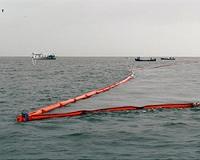| . |  |
. |
Dauphin Island, Alabama (AFP) May 15, 2010 With its white-beach paradise under threat from a massive Gulf of Mexico oil spill, this island resort has been transformed into a makeshift fortress ringed by massive and unsightly sea walls. These last lines of defense against toxic crude give new meaning to the term barrier island. With tar balls already washing ashore in Alabama and Louisiana, residents here turned to desperate measures, enlisting 125 Alabama National Guard troops to set up several miles of sand berms and military barriers on the beach to protect a fragile ecosystem and the substantial tourism industry. "You need credentials to get on this beach, there is heavy machinery at work here," barked one police officer as men in camouflage pants toiled under a brutal sun to set a series of fortifications that are more at home on US military bases in Iraq than at the edge of a popular American vacation spot. Dozens of backhoes, bulldozers and dump trucks were scurrying about the beach to build a huge double barrier of sand between the sea and hundreds of villas on stilts. The 11-kilometer (seven-mile) artificial dunes runs about half the length of this small island off the Alabama coast that is home to just 1,300 year-round residents -- and tens of thousands who flock to the island in summer. At more than two meters (6.5 feet) high, they block the view of the Gulf which most visitors come here to admire. One backhoe operator who grew up near Dauphin insisted the barrier was crucial to help protect the low-level island from being coated in an oily sheen. "When there are large waves the water goes up the road, 100 yards (meters) from the beach," said the man who identified himself only as Bradly. "We built this double dune to be sure that oil will stop on the beach and not spread over the island," he told AFP. Bradly and others have reason to be wary. Five years ago, 350 homes on the island were destroyed by Hurricane Katrina, and the community is loath to suffer another disaster. But since the BP-leased Deepwater Horizon drilling platform exploded and sank in the Gulf of Mexico more than three weeks ago, rupturing a riser pipe that is now spewing crude oil uncontrollably into the water, they have been staring catastrophe in the face. On the remote northwest of the island, where marshes are home to pelicans and herons, the National Guard has been erecting a more high-tech barrier. The so-called Hesco bastion is comprised of wire mesh containers filled with sand and a chemical which experts hope will serve as a major weapon against oil pollution. This six-kilometer line of square, basket-like containers will trap and filter oily water using a powdery substance called C.I. Agent, which National Guard Captain Matt Terry said conveniently turns the oil into a gelatinous substance. "It turns the oil into a solid. Once the oil washes ashore, it will wash into these baskets, the agent will turn into a solid, like rubber," he said. The Hesco barrier on Dauphin Island is now "the world's longest oil-water separator," said Dan Koons of C.I. Agent Solutions, which developed the non-toxic, bio-degradable powder a decade ago. With military Humvees and heavy equipment crawling over the island, Dauphin has lost its legendary tranquility, and most tourists have fled, yet only a few bucketfuls of oil have been plucked from the shore. Local business owners have been left scowling. Business "is about half of what it should be" since the spill began last month, "because they are not allowing the tourists go to the west end where they're doing the berm, so they can't rent the houses," said Gary Skinner, 59, who runs Skinner's Seafood. "It's hard," he said, given that 75 percent of revenues come in from early May to late August -- and no aid proposals have been presented by local authorities or from oil giant BP. A few tourists sunbathing on the beach took the protective action in stride, including Joyce Smith, 53, who refused to let an unsightly barrier ruin her vacation. "I would rather (the trucks) weren't here, but it doesn't affect me," the Tennessee native said as she and a companion surveyed the action from their lawnchairs in the middle of a nearly deserted beach. "There is not a lot of people here right now, I hope in the summer there'll be more," she said. Smith said she had heard of many cancellations this week, but stressed to a real estate agent that she was undeterred. "I told him, as long as the beach would be open, we'll be here."
Share This Article With Planet Earth
Related Links Our Polluted World and Cleaning It Up
 Oil washes onto US shores as latest spill solution stalls
Oil washes onto US shores as latest spill solution stallsNew Orleans, Louisiana (AFP) May 15, 2010 Oil leaking from a ruptured well pipe in the Gulf of Mexico washed ashore in two new locations Saturday, the Coast Guard said, as the latest attempt to contain the spill faltered. Efforts to siphon leaking oil via an "insertion tube" up to a container vessel continued a day after US President Barack Obama blasted oil companies for seeking to shift blame for a growing oil slick threatening en ... read more |
|
| The content herein, unless otherwise known to be public domain, are Copyright 1995-2010 - SpaceDaily. AFP and UPI Wire Stories are copyright Agence France-Presse and United Press International. ESA Portal Reports are copyright European Space Agency. All NASA sourced material is public domain. Additional copyrights may apply in whole or part to other bona fide parties. Advertising does not imply endorsement,agreement or approval of any opinions, statements or information provided by SpaceDaily on any Web page published or hosted by SpaceDaily. Privacy Statement |